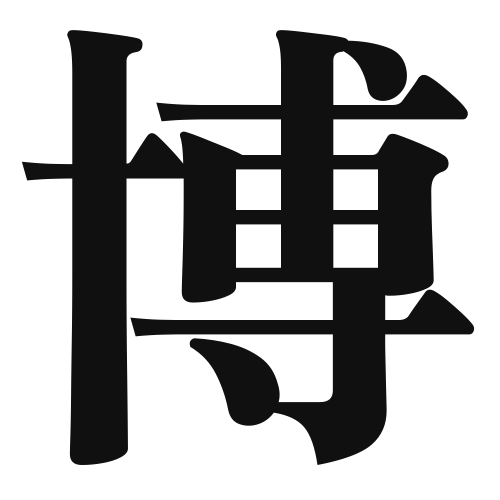1. Overview of Meaning
The kanji “博” (haku) generally means “to expand,” “to broaden,” or “to exhibit.” It is often associated with knowledge, learning, and expertise in various fields.
2. Formation and Radical
Formation of the Kanji: The kanji “博” is a compound character (会意文字) that combines elements to convey its meaning. It consists of the radical “十” (ten) and “白” (white), symbolizing the idea of broadening knowledge or understanding.
Radical: The radical of “博” is “白,” which often relates to the concept of clarity or brightness, further emphasizing the idea of enlightenment through knowledge.
3. Examples of Usage
Common Words and Phrases: Some frequently used words that include “博” are:
- 博物館 (はくぶつかん, hakubutsukan) – Museum
- 博学 (はくがく, hakugaku) – Erudition or extensive knowledge
Example Sentences in Daily Conversation:
- 彼は博物館に行くのが好きです。
(かれははくぶつかんにいくのがすきです。)
(He likes to go to museums.) - 彼女は博学な人です。
(かのじょははくがくなひとです。)
(She is a knowledgeable person.)
4. Synonyms and Antonyms
Similar Kanji: A similar kanji is “広” (ひろ, hiro), which means “wide” or “broad.” While both kanji convey the idea of expansiveness, “博” emphasizes knowledge and learning, whereas “広” focuses more on physical space.
Antonyms: An antonym for “博” could be “狭” (せま, sema), which means “narrow” or “limited,” highlighting the contrast between broad knowledge and limited understanding.
5. Cultural and Historical Background
Relation to Japanese Culture: The concept of “博” is deeply rooted in Japanese culture, where the pursuit of knowledge and wisdom is highly valued. It reflects the importance of education and learning in society.
Proverbs and Idioms: One relevant proverb is “博学多才” (はくがくたさい, hakugaku tasai), which means “knowledgeable and talented in many areas,” emphasizing the value of being well-rounded in knowledge and skills.
